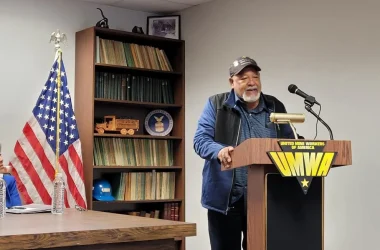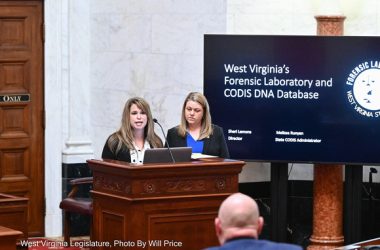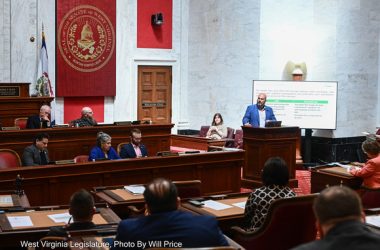By ANDREA LANNOM
The Register-Herald
CHARLESTON, W.Va. — The West Virginia Legislature approved measures in this year’s session ranging from expanding broadband services to the Second Chance for Employment Act.
According to the West Virginia Legislature’s website, both chambers passed 262 bills — 132 House bills and 130 Senate bills. A majority of these are now awaiting signature from Gov. Jim Justice.

One surprise that happened in the early morning hours was Senate Bill 76, the Second Chance for Employment Act. Time was down to the wire and it was the last bill the House passed.
On its first go round in the House, the bill drew a little more than an hour before lawmakers passed a changed version that would have reduced a nonviolent felony offense to a misdemeanor, should a judge grant that reduction.
The original version called for a nonviolent felony offense to be expunged upon the court granting the petition.
The changed version then went back to the Senate Saturday to concur with changes. Majority Leader Sen. Ryan Ferns made an amendment that was adopted to put the Senate’s version back into the bill.
The House concurred with the change at 12:54 Sunday morning.
Another measure that came down to the wire was House Bill 2620, the West Virginia Drug Overdose Monitoring Act. After suspending constitutional rules, the Senate took up and passed the bill.
The bill would establish an Office of Drug Control Policy to provide administrative support, research and other services related to substance abuse. The goal is for the office to analyze substance abuse crime and overdose data in the state. It also would apply for and disburse grants and other funding.
Perhaps the shocking development of the session was the passage of the West Virginia Medical Cannabis Act.
After a surprise procedural move that catapulted a bill to legalize medical marijuana to the House floor, lawmakers ended up passing a changed version of the bill that doesn’t allow smoking or packaged edible products, but a person could get a pill, oil or topical form.
A bill that would allow licensed individuals to lawfully grow hemp also is on the governor’s desk. House Bill 2453 expands the list of people who are currently allowed to grow hemp to individuals who have satisfied the application process.
The Legislature also passed House Bill 3093 Saturday, which establishes broadband enhancement and expansion policies and establishes the Broadband Enhancement Council. It also calls for counties to form nonprofit cooperative associations for internet services.
Several education measures made it through the Legislature, including the governor’s bill, House Bill 2711. It will eliminate Regional Educational Service Agencies and the Office of Education Performance Audits. It provides for students to take a statewide assessment and for schools to develop college entrance exams.
The bill also provides flexibility on the school calendar.
Another education measure passed by the Legislature is Senate Bill 186, which changes the age guidelines for children to start preschool and kindergarten.
The bill changes the birthdate from Sept. 1 to July 1 for early childhood education and kindergarten enrollment.
One health-related measure that made its way through both chambers the last day of session was House Bill 2520, which prevents teens from using a tanning bed in a public tanning salon. Current law allows parental permission for 14-to-18-year-olds.
Senate Bill 288, or Emmaleigh’s Law, which increases the penalties for child abuse causing death, also is on its way to the governor’s desk.
The bill stems from a case out of Jackson County where 10-month-old Emmaleigh Barringer died of a skull fracture and was sexually assaulted. Her mother’s boyfriend has been charged in her death.
The measure increases the penalty for intentional or malicious infliction of pain, illness, impairment of physical condition and causing death. It remains a felony and the penalty is equivalent to first-degree murder of 15 years to life.
Both chambers passed Senate Bill 240, called the “revenge porn” bill, which would make it a crime to distribute sexual images without consent.
Under this bill, a person convicted on a first offense would be guilty of a misdemeanor and face up to a year in jail and a $1,000 to $5,000 fine. For a second violation, a person could be charged with a felony and sentenced to up to three years in prison and fined $2,500 to $10,000.
The Legislature passed House Bill 2318, which increases penalties for instances of human trafficking in West Virginia and strengthens the legal definitions of what constitutes human trafficking. Justice has signed this bill.
The Legislature passed House Bill 2646, which would eliminate funding for the West Virginia Women’s Commission. According to the commission’s website, the agency was created by the Legislature in 1977 and is the only agency mandated to bring women’s issues to the attention of the executive and legislative branches of government.
The Legislature also passed two of the governor’s roads and infrastructure measures. The first, House Bill 2722, eliminates some financial limitations. The second, Senate Joint Resolution 6, called Roads to Prosperity, would authorize $1.6 billion in bonds.
The Legislature passed House Bill 2935, which deals with state flood protection planning. The bill would create an interim committee charged with studying flood damage reduction and flood plain management.
It also would create the State Flood Protection Planning Council, which would consist of seven members, and would review and update the state flood protection plan and recommend legislation to reduce or mitigate flood damage.
Among measures that did not pass muster was one that would have sold Jackie Withrow Hospital in Beckley.
On Thursday, the Senate passed an amended version of House Bill 2366, which called for a new 90-bed facility to be built and patients to be transferred upon the sale of the facility.
It also would have created a benefits package for all those who are laid off, employed by a successor company or retire as a result of the divestment.
After the Senate passed the bill, it headed over to the House to concur, but the body did not take it up Saturday.
See more from The Register-Herald





